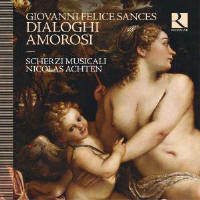Texte paru dans: / Appeared in: |
|
| Highly recommended. |
Outil de traduction ~ (Très approximatif) |
|
Reviewer: Barry
Brenesal Giovanni Felice Sances (1600–1679) belongs to that generation of Italian émigrés who owed their good fortune in part to the seconda pratica’s international popularity. In 1637, he was vetted by agents of Emperor Ferdinand III, a great enthusiast of the latest Italian musical trends. Sances subsequently joined the Imperial Chapel in Vienna, and soon became the best-paid singer there—in a court where musicians received excellent lodgings, fine clothes, and salaries that were competitive with any across Europe. He was made vice-Kapellmeister in 1649 under Antonio Bertali; and when the latter died 20 years later, Sances took his place at the head of the Emperor’s extensive musical establishment. There he demonstrated not merely great compositional facility and skill, but a keen hand with administration. He also proved adept at the time-honored art of nepotism, securing appointments for his children and other relatives both in the Chapel and at court. Much of Sances’s surviving secular music takes the form of pieces for one or two voices; typically strophic songs, multi-section arias, and dramatic scenes in stile recitativo. Grove I compliments the composer on the high quality of his work and as a noteworthy melodist. Achten in turn praises his music for its sensuality, elegance, and expressivity. Sances is capable of unexpected harmonic progressions, sudden metrical shifts and displaced accents, but never in a fashion that draws attention away from his musical line. Rather, like Giulio Caccini in an older generation, these departures from dance-like elements and ostinatos serve to enhance the stories of his selected verse. The texts on 18 cuts (two others are instrumentals by Salomone Rossi and Girolamo Viviani) are varied in structure and sentiment, no doubt in part to give Sances an opportunity to demonstrate the range of his expressive gifts. The speaker of Pietosi, allontanatevi laments the death of his beloved; a lover summons up enough metaphors to furnish five poems as he extols his beloved in Occhi, sfere vivaci. The cynical narrator of Chi nel regno almo d’Amore (who might well be Don Alfonso—or possibly Lorenzo Da Ponte) advises a young man to embrace serial monogamy: “Should the modest girl drive you away, see to it that the audacious one brings you contentment. Should the blonde one mock you, then seduce the brunette in revenge.” Three pieces of extended and fluid recitative (and a fourth that’s strophic melody) narrate Ruggiero’s rescue of Angelica from a sea monster in Ariosto’s influential and popular epic poem “Orlando furioso.” The performances are anything but amateurish. I’ve praised Nicolas Achten and his Scherzi Muscale three times before, in Bertali’s La Maddalena (Ricercar 367), Mazzocchi’s La Catena d’Adone (Alpha 184), and Caccini’s L’Euridice (Ricercar 269). Only the Caccini was problematic, largely for its passionless theatrical treatment and over-reverberant acoustic. Neither of those issues have held true for either of Achten’s later releases, and certainly not for this disc. Achten in particular, who takes the narrator’s part in the Orlando furioso selections, demonstrates a fine grasp of theatrics while remaining true to the period’s sense of style. His voice is, as ever, a rather dry, high baritone, but displaying perfect evenness and great agility in florid passages. Tenor Reinoud von Mechelen and soprano Deborah Cachet were both featured on earlier releases of the ensemble, and are most welcome for their agility, enunciation, and firm, focused tone. The fourth vocalist, soprano Hanna Al-Bender, is not quite up to the same standard as the others. Her upper register invokes a “column of sound” approach with little change to volume or expressivity, made still more problematic by the complete absence of consonants. She also doesn’t blend well with the others, an example being Sciocchi amanti che credete—and there’s a moment towards the end, on “mà villania,” when her slur is broader and slower than Achten’s and Mechelen’s, rendering them momentarily out of sync. She can soften attractively on occasion, and handles ornaments well, however. The timings are generous, the sound close and well defined. Releases of Sances’s music are still infrequent, though every one I’ve heard since ASV’s discontinued series two decades ago possesses some merit. This rates among the best, and well worth the attention of any classical listener who prizes the music of early 17th-century composers from the Italian States. Highly recommended. | |
|
|
|
|
Cliquez l'un ou l'autre
bouton pour découvrir bien d'autres critiques de CD |
|




